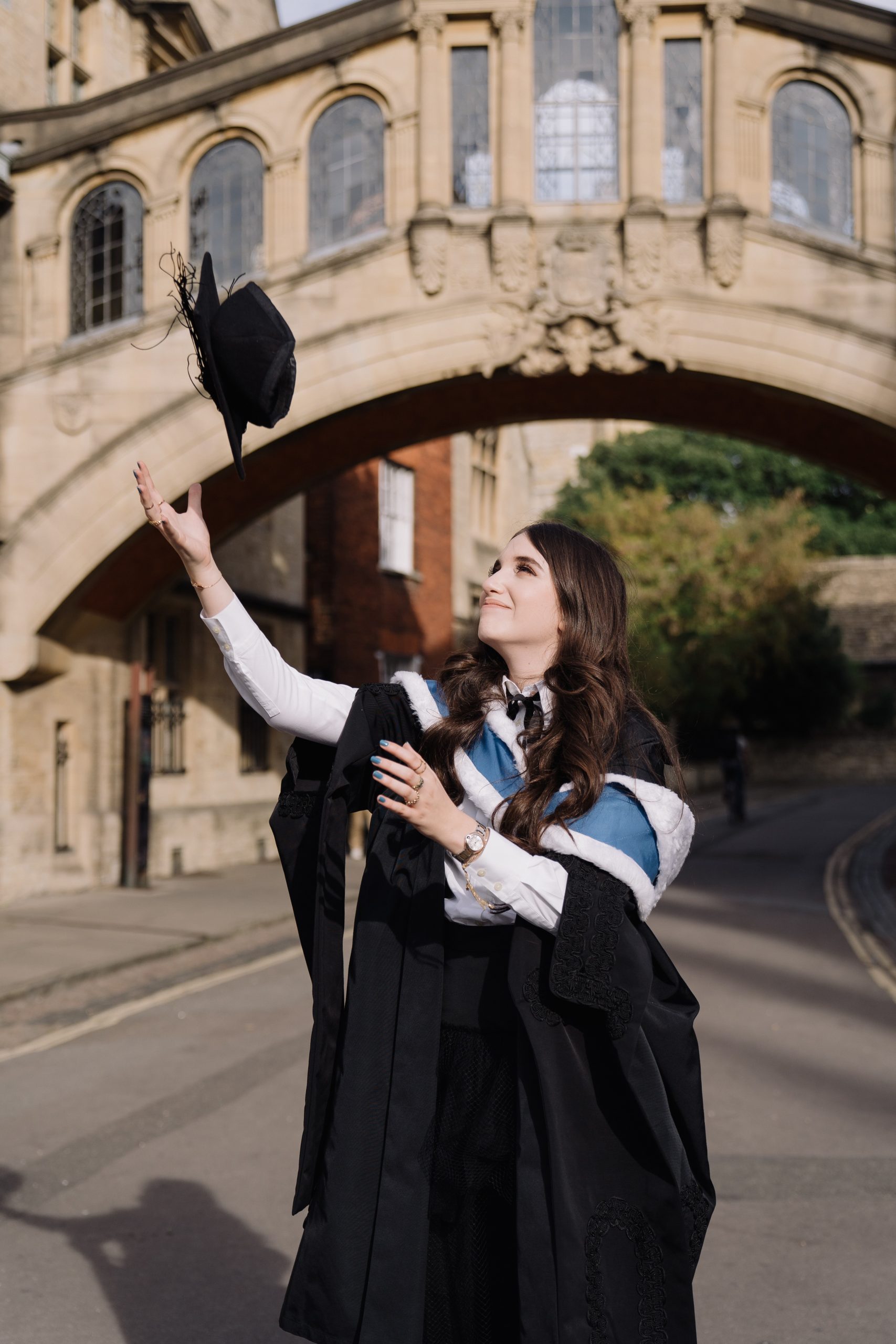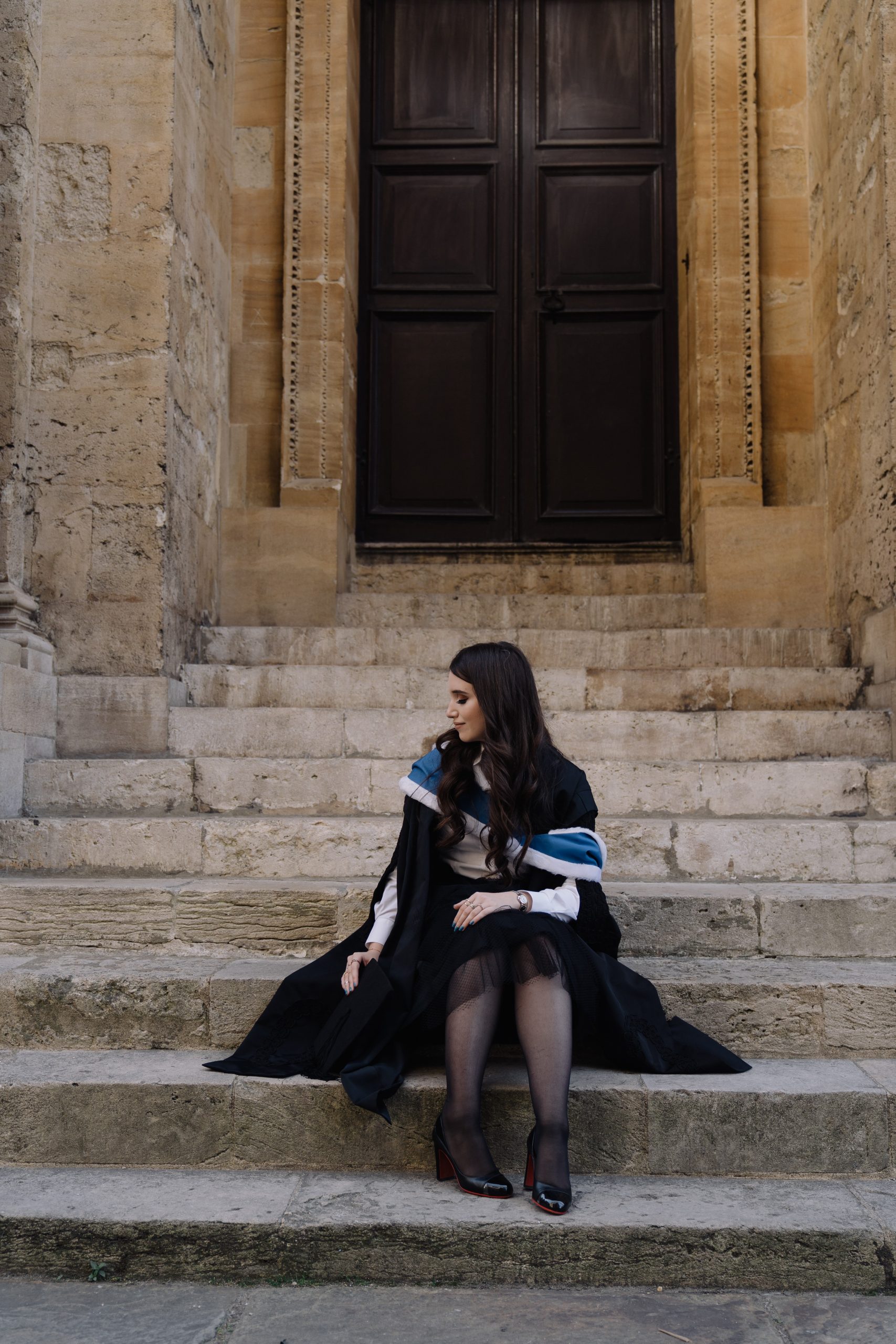
We spoke to our Admissions Mentor, Anna, about her experience at the University of Oxford. Learn more about how to decide whether to apply to Oxford, the application process, and what life is like studying at one of the world’s top universities.
Anna completed a BA in Law and a Bachelor of Civil Law (BCL) at Oxford as well as a Master of Laws (LL.M.) at Harvard University. She is currently studying towards a PhD at the University of Cambridge.

Choosing Oxford:
So, why did you choose Oxford?
“I chose Oxford because it has the reputation of being one of, if not the best, places to study legal philosophy, which is still my area of interest.”
Why did you choose Oxford over Cambridge?
“My main motivation for choosing Oxford for my undergraduate degree was the curriculum. Law degrees at Oxford and Cambridge are not identical – Oxford places more emphasis on jurisprudence, while Cambridge’s course is more practical. As I wanted to be a legal philosopher, the former was a natural choice. I’d advise all applicants to thoroughly research the course they are applying for – luckily, there is an abundance of freely available resources.
For my Masters, I chose Oxford because the BCL is known globally as the most rigorous Masters program in law. I was able to narrow my studies down to what truly interested me, taking courses on jurisprudence, constitutional theory, and the philosophical foundations of common law. While the Cambridge Master of Law (LLM) has its strengths, they lie in areas of study that do not interest me, such as international law and corporate law.
Interestingly, I am now studying a PhD at Cambridge, in order to work with my supervisor, who is based there. After spending four years in Oxford, I wished for a change of scenery.”
Who would you recommend applying to Oxbridge? Is it for everyone?
“There is no ideal ‘Oxbridge type’. Ultimately what Oxford and Cambridge are looking for are one’s interest and potential, expressed through one’s application materials and interview performance. While you are expected to have good grades, you need not be a perfect student, as long as you are truly passionate about your subject and can motivate yourself to work hard enough to withstand the Oxbridge workload. That said, if neither university offers the degree you really want to pursue, then reconsider your options.
Try not to fall for stereotypes. For example, while many (rightly) point out that the Oxbridge tutorial system does not suit everyone, you should bear in mind that it seems much less intimidating once you get there, and a lot of students thrive in tutorials. Again, do your research before deciding whether Oxbridge is for you.”
Which other universities did you consider?
“For my undergrad, I also applied to, and received offers from, Durham, LSE, KCL and Queen Mary. For my Masters, besides Oxford and Cambridge, I applied to Harvard, NYU and Yale, and received offers from all but Yale. In the end, I deferred my LLM at Harvard, taking it after finishing my BCL at Oxford.”
Colleges:
Which college were you in?
“For my undergrad and Masters at Oxford, I was in Hertford College.”
How did you go about choosing your college?
“Before my undergrad, I went to the Oxford Open Day, and visited several colleges. I really enjoyed talking to Hertford’s law tutors and I wanted to be taught by them, which made me put it as my preference. However, I do not think that your choice of college is as important as most make it out to be – a lot of my friends were ‘pooled’ into colleges they did not apply to and ended up loving their new ‘home’ nonetheless.
At Masters and PhD level, you apply to a department – the Law Faculty – rather than a college. You are given an opportunity to input your college preference, but there is a high chance you will be ‘pooled’ to another college based on available spaces. I put my undergraduate college, Hertford, as my preference when applying for the BCL as I did not want to adapt to a new environment in a short time of a one-year Masters.”
What are some of the benefits of the college system?
“At undergrad level, the collegiate system means that you are able to be mentored by the leading scholars in your field – fellows at your college. This means you can get to know them more than you would in just lectures or seminars. This bond is very important for you in your personal and professional development, especially if you consider academia an option.
At Masters and PhD level, graduate students work in their departments and with their supervisors rather than with fellows at their college, so colleges lose that significance and simply become places for students from different disciplines to socialise and exchange ideas.”
Admissions:
How long in advance did you prepare?
“I started thinking about applying to Oxford a year before the admission cycle, as soon as I entered the first year of my IB Diploma Programme. However, the bulk of my preparation happened during late summer and autumn of the admission year.”
Did you have to sit any entry exams?
“Besides my IB exams, I had to take the Law National Aptitude Test (LNAT).”
How did you prepare? Did you use any books, online guides etc?
“Although I read oft-recommended books such as ‘Letters to a Law Student’, personally I did not find them to be particularly useful or inspiring, and so I did not include them in my personal statement. Instead, I focused on doing law-related activities that truly interested me. I read (or, rather, tried to read as I am discovering now as a graduate) legal philosophy, watched lectures and talks on YouTube, and visited courts. I think that this ‘tailoring’ of educational experiences to your interests is crucial when it comes to writing a personal statement that truly stands out and reflects on you as a unique applicant with their own story to tell.
For the LNAT, I practiced the first (multiple choice) part using publicly available sample papers, question books, and online resources. I also wrote about a dozen timed essays to prepare for the second (essay) part.
Having mock interviews organised via an educational consultancy was also really helpful. While my real interview turned out to be nothing like the mock ones, practicing helped me build my confidence and communication skills. Once you have done it once, you are not as nervous about the real deal.”
What was the interview like?
“I had two interviews with two tutors at the same college. Before each interview, I was given around 30 minutes to read and think about a piece of writing, which I then proceeded to discuss with my interviewers. The first one was an extract from a statute and a family law problem I had to solve using it, and the second was an excerpt from R (Purdy) v DPP, a famous House of Lords decision concerning euthanasia. I was not asked anything about my personal statement, or myself for that matter.
I remember feeling very confident after the interviews, but it is in no way a universal indicator of acceptance and vice versa – my Oxbridge friends’ interview experiences were very varied.”
How important was your personal statement in your application?
“It is hard to judge; it was probably useful at the pre-interview stage, but I was not asked about it at all during the interview.”
Experience at Oxford:
Overall, how would you describe your experience at Oxford?
“I really enjoyed my time in Oxford, both as an undergraduate and a Masters student. It is a perfect place to go if you really love your subject and want to challenge yourself. While every student’s life has ups and downs and it is unrealistic to believe that Oxbridge is perfect, I would do it again in a heartbeat. I encourage everyone considering applying to Oxford or Cambridge to go to the open days, attend summer schools, chat with current students, and ultimately ‘shoot their shot’ and apply, whether to an undergraduate or a graduate program.”
If you’d like any assistance with the Oxbridge admissions process, or if you need help deciding where to apply, get in touch with our team today.